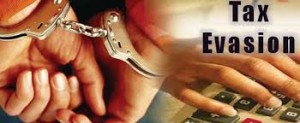Why people should avoid tax evasion?
 A recent report released by the Indian Finance Ministry stated that the number of taxpayers in India for the financial year 2011-12 is around 3.24 crore. It means that less than 3 people in 100 pay their taxes duly.
A recent report released by the Indian Finance Ministry stated that the number of taxpayers in India for the financial year 2011-12 is around 3.24 crore. It means that less than 3 people in 100 pay their taxes duly.
The Central Board of Direct Taxes is examining the provisions of the Income Tax Act which should deal with offences relating to tax evasion. The said examination would be completed within 31.3.2015. Tax Evasion would become a serious offence inviting imprisonment for offenders. The Apex Court has appointed a special investigation team to prevent the loss of revenue on account of tax evasion.
The essence of tax evasion:
People in India have the freedom to self-assess their income and pay taxes accordingly but that does not give individuals the freedom to not pay taxes by concealing a particular source of income.
Tax evasion is an illegal activity. It refers to failure in filing income tax returns or misrepresenting the amount of taxes to be paid.
It is distinguished from tax avoidance which is a legal activity. In tax avoidance one can take the help of “tax laws” to reduce the amount of tax which is payable.
How tax evasion is detected?
The income tax returns are scrutinized by the department only when the tax authorities feel that there is involvement of tax evasion. If it is found that an individual has deliberately concealed his income to reduce his tax liability, he shall be penalized.
Scrutiny means evaluating a tax return for its correctness. The income tax assessing officer examines the returns and other documents like bank statement, form 16, etc. to find out if there is any false statement in tax liability assessed by the individual. The officer will request the tax payer to produce all documents such as bank account statements, credit card statements and other relevant documents to proceed with the scrutiny process.
In most cases, when a return is picked up for scrutiny, a notice is served within one year from the month in which returns have been filed. So one files his return on 30.7.2012, he may get a scrutiny notice on or before 29.7.2013. Such notice contains all relevant details of the tax payer and a date on which the tax payer has to appear before the income tax officer.
The tax payer does not require attending such meeting in person. He can send a representative to plead on his behalf.
Consequences of tax evasion:
If the department finds that you have concealed income, a penalty shall be levied which may go up to 3 times the amount of tax which the tax payer has evaded.
How to avoid such situation?
Many salaried people think as tax is deducted at source for salary, they have no tax liability. But it is not so.
There are many sources of income where tax may not have been deducted at source. If one has income from interest on bank savings account or receives rent from property, such income should be declared as they do not involve tax deduction at source.
For the said reasons one should consider all factors while filing returns and take precautions returns because any anomaly in his return can result in scrutiny which cause a lot of mental stress other than financial burden of penalty.


 ITAT Amritsar: No Section 269SS Violation for One-Time Cash Payment Before Sub-Registrar
ITAT Amritsar: No Section 269SS Violation for One-Time Cash Payment Before Sub-Registrar  Tax Officials Unleash Digital Dragnet: How New Raid Powers Redefine Privacy, Property Rights in India and likely to Fuel Corruption
Tax Officials Unleash Digital Dragnet: How New Raid Powers Redefine Privacy, Property Rights in India and likely to Fuel Corruption  Income Tax Department Rewards for Reporting Tax Evasion: A Comprehensive Guide
Income Tax Department Rewards for Reporting Tax Evasion: A Comprehensive Guide  Forfeiture of Gratuity by Employer- What are the Remedies for an employee- Can employer be challenged?
Forfeiture of Gratuity by Employer- What are the Remedies for an employee- Can employer be challenged?  Employer can forfeit gratuity of an employee in case of moral turpitude
Employer can forfeit gratuity of an employee in case of moral turpitude  Diving Deeper: The Impact of the New Tax Bill on Dairy and Farming Income
Diving Deeper: The Impact of the New Tax Bill on Dairy and Farming Income